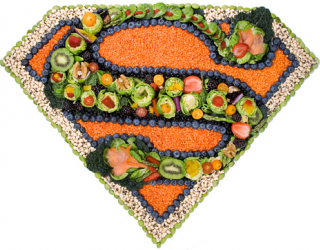Over 500,000 people die from cancer every year. While the yearly cancer death rate has decreased by 20% since 1991, the incidence of cancer continues to rise year after year.[1]
It’s clear that while we’re learning how to diagnose and treat cancer, but we’re not paying enough attention to its root causes.
Fortunately, cancer treatment approaches are becoming more sophisticated and whole-system-oriented. At the heart of all holistic treatment protocols is proper diet—one which detoxifies and alkalizes the body, builds the immune system, and provides all the nutrients necessary to create an environment that is inhospitable to cancer cells.
Diet (and other lifestyle modifications) focus less on directing waging war on cancer cells, and more on giving the body everything it needs to balance and heal itself.
This principle is important because it bridges the worlds of prevention and treatment. An optimal, nutrient-dense diet can be helpful for preventing and treating cancer.
So whether you’re currently battling cancer, trying to prevent recurrence, or striving to prevent cancer in the first place, the powerhouse foods discussed below are an excellent choice.
Omega-3 fatty acids
The American diet is notorious for being overloaded with omega-6’s and deficient in omega-3’s. These beneficial fatty acids powerfully reduce inflammation, thus taking a load off the immune system and letting it go to work on cancerous cells.
Fish, fish oil, cod liver oil, krill oil (which is considered the most sustainable seafood source), hemp seed, hemp oil, flax seed, and flax oil are all great sources of omega-3’s. Make sure you’re getting between 1,000-2,000 mg per day.
Cruciferous vegetables
This recommendation should come as no surprise; after all, you’ve probably been hearing since you were a little kid that greens are good for you.
Vegetables like kale, broccoli, cauliflower, cabbage, watercress, Brussel sprouts, arugula, and their related cousins contain a plethora of detoxifying and health-promoting compounds, including sulforaphane and other phytonutrients. Kale and broccoli are especially potent cancer fighters.
Antioxidant-rich berries
Dark berries contain a wealth of antioxidants, phytonutrients, and a tumor-inhibiting compound called ellagic acid.
Black raspberries, acai berries, camu camu berries, and amla berries take the cake for raw antioxidant power; you can’t really go wrong, though, as long as you watch out for high levels of sugar, which can feed the growth of tumors.
Kombucha
Probiotic-rich foods and drinks offer exceptional support for the immune system by promoting a healthy microbiome. Microbiologists are only just beginning to understand the complex system of microorganisms that call our bodies home, but one thing they’re sure about is that these little creatures are vital for optimal immune function.
Kombucha in particular is also very high in glucaric acid, which was shown by a recent study to be an impressive cancer preventative.[2]
Turmeric
This incredible little root is highly anti-inflammatory, thanks to a compound called curcumin, which inhibits the body’s pro-inflammatory compounds like a champion. This quelling of inflammation leaves the body in a much better place to combat cancer.
But curcumin doesn’t stop there…it’s also capable of directly destroying cancer cells and promoting healthy cell function by altering the fundamental genetic expression of cells. To receive maximum benefit, make sure to consume either raw turmeric root or a CO2 turmeric extract (which keeps all of its beneficial compounds in tact).
Squalene-containing foods
Squalene is one of the most potent anti-cancer compounds on the planet. It’s often used in conjunction with chemotherapy, because of its ability to prevent many accompanying side effects. Other studies show that it has a direct tumor-inhibiting quality, as well.[3]
Shark liver oil has a very high squalene content, but it’s hard to come by and produced by an incredibly unsustainable and inhumane industry. Instead, stick with olive oil and amaranth oil (which has an exceptionally high squalene content, and high bioavailability, as well).
The whole picture
There’s a theme that runs throughout these food recommendations—namely that anti-inflammatory, high-antioxidant, nutrient-dense foods are the key to a balanced and thriving body.
If cancer is on the rise, it’s most likely because mainstream diets bear almost no resemblance to the “menu” presented above. But with a bit of education and discipline, we can turn the tide—we might not need to go any further than our own kitchens to find the elusive cure for cancer.
References
[1] http://articles.mercola.com/sites/articles/archive/2013/01/26/cancer-death-rate-declines.aspx
[2] http://www.ncbi.nlm.nih.gov/pubmed/2208084?dopt=Abstract






